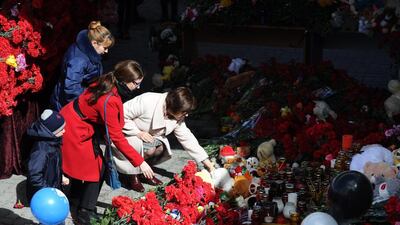How do you cope with disaster?
It is a question that the world’s airlines must always be ready to answer, even as they hope they will never need to.
And when disaster strikes, as it did for FlyDubai at the weekend, the airline must consider not only itself as a corporation but also the needs of the victims’ relatives and its own clients, partners and employees.
Recovery requires one thing above all others: time.
Robert Bor, a UK clinical psychologist who specialises in issues around aviation, noted that in the wake of such disasters usually there are more staff calling in sick. In normal times, usually 1 to 2 per cent of staff would be absent on a given day. That number surges to between 5 and 25 per cent in the aftermath of a crash, as workers are reeling emotionally from the death of colleagues.
Janie-Lee Brown, operations manager at Morgan McKinley in Dubai, a specialist recruitment consultancy, said: “After the tragedy of September 11, employees were allowed the flexibility to take time off to deal with their grief personally.”
Ms Brown said that if some employees were on a limited employment contract, they could be offered the option to get out of it, if they wished to.
It can take 6-12 months to recover, Mr Bor said. “In the face of trauma, in the most intense cases, people could stay paralysed for the first couple of days. But it is usually the first year, the first anniversary before things settle down and start to get better,” Mr Bor said yesterday.
Carey Kirk, counseling psychologist and programme coordinator of Raymee Grief Centre LightHouse Arabia in Dubai, said whatever an airline’s coping strategy was, it had to tailor it to a personal level.
“As far as grief is concerned each person will have a timeline. It is related to their personality, life experience, their relationship with the people who died. All of these factors will affect how a person grieves,” she said.
Grief was “a massive process adjustment” she said and not simply an emotion. It comes with different kinds of emotions and basically how people will go about accepting the reality of their loss and re-invest their energy into their life.
Mr Bor said that most modern airlines have a “disaster team” to prepare for crisis. The team can offer counseling support for employees and for the families of the deceased; families may be offered a visit to the place of the crash to feel “emotional closeness” with their loved ones.
Over the past 48 hours, FlyDubai has held two press conferences and made about 10 press statements. In one statement, the airline said it was making arrangements for the families who wished to visit the scene of the accident, to do so. “We would ask that at such a sensitive time all the families be given the space they need to grieve.”
Mr Bor emphasised the importance of companies’ leadership to be sympathetic, talk openly to the media and provide immediate financial support for the family of the deceased.
To address immediate financial needs, FlyDubai said it will pay victims’ families US$20,000 (Dh73,455) per passenger.
If one airline has become dreadfully familiar with the lessons of coping with disaster, it is Malaysia Airlines (MAS).
No carrier has suffered more in modern times. On March 8, 2014, its Flight MH370 disappeared, with no wreckage being found until a wing flap washed up on an island off Madagascar on July 29, last year. The mystery of the plane and the 239 aboard dominated TV news for weeks.
The airline’s strategy was first to quieten public aspects of its marketing, while still working behind the scenes with its partners to keep business flowing. The airline also tended to mourners, inside and outside its ranks, before finally resuming public marketing efforts a little over two months after the disappearance.
Hugh Noel Dunleavy, Malaysia Airlines director of commercial, laid out the strategy in an interview with the website Travel Daily News Asia in May 2014.
“MAS suspended all of our online and offline communications activities worldwide on March 8. At the same time, we shifted our mode of marketing to engage with our travel agency trade partners to support our regular indirect sales activities. ... The airline opened up an incident web site to provide up-to-date information on the MH370 incident. The key focus of the airline being the welfare of the family members of the passengers and crew of MH370 and ensuring their care and wellbeing.
“MAS has returned to our regular business functions on the web site as of May 7, [about] two months after the MH370 incident. With the restart of our commercial website, we will also be launching a series of tactical price point advertising in several markets including Malaysia starting on May 15.”
That was the plan.
But two months after Mr Dunleavy’s interview, an MAS flight from Amsterdam was shot down over Ukraine, on July 17, 2014 – 298 people died. The Dutch safety board ruled that the plane had been hit by a Russian-made Buk surface-to-air missile.
To deal with this second blow, MAS engaged in a full-scale restructuring. There have been layoffs and route changes, but the chief executive Christoph Mueller says better times are at last in sight.
“The biggest challenge is really to go back to the good old times when we won the best customer quality awards,” Mr Mueller said last month. “We will do a lot of work on our product this year.”
business@thenational.ae

